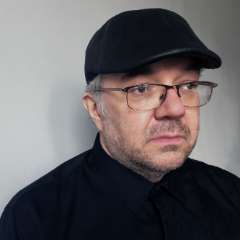
Kurt Gottschalk
Voici 50 des 141 articles
Loading image...
18 déc. 2020
Jeunes Artistes à Suivre : Marianna Liik, compositrice concrète
Loading image...
Loading image...
New York
04 févr. 2026
Minimalism with a beating heart: Julius Eastman's Femenine
Loading image...
Loading image...
New York
22 janv. 2026
Igor Levit brings Beethoven and Rzewski to Carnegie Hall
Loading image...
Loading image...
Brooklyn
09 déc. 2025
Talea Ensemble casts Berio’s Sequenze against recent works
Loading image...
Loading image...
New York
02 nov. 2025
Sonnambula and Davóne Tines restore a court entertainment at The Frick
Loading image...
Loading image...
New York
05 oct. 2025
ICE plays Jennie C Jones at the Metropolitan Museum
Loading image...
Loading image...
New York
30 sept. 2025
Haas’ 11,000 Strings at Park Avenue Armory
Loading image...
Loading image...
New York
16 août 2025
From Bali to New York City with the marimbas of Sixtrum Percussion
Loading image...
Loading image...
New York
10 juil. 2025
Matthew Aucoin's Music for New Bodies at Lincoln Center
Loading image...
Cologne
29 juin 2025
Music from Wonderland to Heaven at Kölner Philharmonie
Loading image...
Loading image...
23 juin 2025
Double music: Makoto Ozone combines jazz and classical with Tokyo Phil
Loading image...
Loading image...
New York
22 mai 2025
The NY Phil premieres Kate Soper and takes percussion to Glass
Loading image...
New York
15 mai 2025
Heartbeat Opera's Faust: an economical deal with the devil
Loading image...
Loading image...
New York
25 avril 2025
A violin sensation tests his mettle as a re-composer
Loading image...
Loading image...
New York
23 mars 2025
Biber’s life of Christ falls on contemporary ears
Loading image...
Loading image...
New York
12 mars 2025
JACK Quartet puts Boulez in broader context
Loading image...
Houston
15 févr. 2025
Death and lunacy in Juraj Valčuha's Houston Symphony program
Loading image...
Loading image...
Brooklyn
09 févr. 2025
Tracing the tragic, true stories of two women two centuries apart
Loading image...
Loading image...
New York
31 janv. 2025
Conrad Tao’s glorious exercises in parody, persistence and technology
Loading image...
New York
23 janv. 2025
Compelling new opera explores a 300-year-old feminist dream
Loading image...
Loading image...
08 janv. 2025
Insatiable curiosity: Alisa Weilerstein premieres new cello concertos
Loading image...
Loading image...
New York
07 déc. 2024
A toy-box of tyranny: Shostakovich, Stalin and Kentridge collide
Loading image...
Loading image...
New York
03 déc. 2024
Holding patterns and happy disruptions from New York's TAK ensemble
Loading image...
Loading image...
New York
15 oct. 2024
Lorca retold in Met's remarkable restaging of Golijov’s Ainadamar
Loading image...
Loading image...
New York
23 sept. 2024
A brief journey into the timeless world of Meredith Monk
Loading image...
Loading image...
New York
15 août 2024
Wet Ink Ensemble at Time:Spans festival
Loading image...
Loading image...
31 juil. 2024
Joana Mallwitz: breathing new life into Kurt Weill
Loading image...
Loading image...
Frankfurt am Main
03 juil. 2024
Ensemble Modern stages a post-war Modernist revival
Loading image...
Loading image...
New York
08 juin 2024
An immersion into the psyche of Stockhausen at the Park Avenue Armory
Loading image...
Loading image...
New York
21 mai 2024
Bach cantatas, American spirituals, global calamity
Loading image...
Loading image...
New York
10 mai 2024
Sound On for contemporary works with the New York Philharmonic
Loading image...
Loading image...
New York
23 avril 2024
The Greatest Story Ever Told gets a new look in the Met's El Niño
Loading image...
Loading image...
New York
13 avril 2024
Ensemble Modern brings music of global migration to New York City
Loading image...
Loading image...
New York
03 avril 2024
Cello alone: Alisa Weilerstein in a stunning program at 92Y
Loading image...
Loading image...
New York
29 févr. 2024
The Knights on the eve of war at Carnegie Hall
Loading image...
Loading image...
New York
18 janv. 2024
A dramatic night with the Lincoln Center Chamber Music Society
Loading image...
Loading image...
New York
13 janv. 2024
Atom Egoyan's movie Adoration is revived as an opera
Loading image...
Loading image...
New York
16 déc. 2023
A Feldmanesque meditation by Tyshawn Sorey
Loading image...
New York
10 déc. 2023
The nonet Art of Fugue plays perfectly at Lincoln Center
Loading image...
Loading image...
New York
28 nov. 2023
Resilience, if not resolution: piano dialogues with Tendler and Hanick
Loading image...
Loading image...
New York
07 nov. 2023
Malcolm X reaches the Met Opera at a crucial time
Loading image...
05 nov. 2023
Ugly, unnatural and ghastly: John Malkovich becomes a music critic
Loading image...
Loading image...
03 nov. 2023
Eclectic programming of a restless spirit: Conrad Tao
Loading image...
Loading image...
02 nov. 2023
Magical realism in miniature: Caroline Shaw
Loading image...
Loading image...
New York
06 oct. 2023
Reich premiere at the center of an evening of unexpected pleasures
Loading image...
Loading image...
Brooklyn
24 sept. 2023
Ligeti shines, despite pageantry, in Han Chen's centennial recital
Loading image...
Loading image...
Ostrava
01 sept. 2023
Casting Trump as a 21st-century Brechtian villain
Loading image...
Loading image...
Ostrava
27 août 2023
Underscoring the power of the orchestra: Ostrava Days
Loading image...
Loading image...
New York
25 juil. 2023
Three premieres – heard twice – in New York
Loading image...
Loading image...
New York
01 juil. 2023
Igor Levit makes a (successful) spectacle of Morton Feldman

